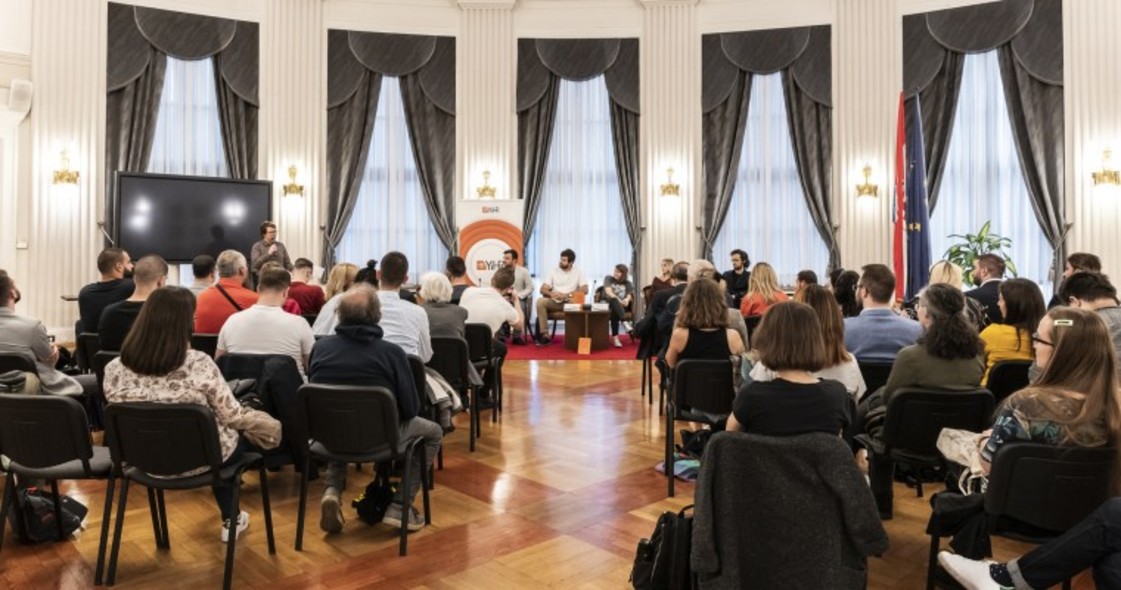Zagreb,June 15, 2022
On Thursday, June 9, 2022, we presented the book Shared Narratives: Supporting Reconciliation by Bridging the Gaps in Divisive Narratives created by more than 100 young people from five countries in the region (Serbia, Montenegro, Bosnia and Herzegovina, Kosovo, and Croatia) with the goal of collective critical review of existing formal and informal versions of the history of the wars of the 1990s.
The author of the project within which the book was created is Mario Mažić, the founder of the Youth Initiative for Human Rights – Croatia, who together with Maja Nenadović is the editor of Shared Narratives. Mažić and Nenadović point out that the basic goal of “Shared Narratives” is “to support reconciliation and engage youth in the process of dialogue with a view of preventing recurrence of violence in former Yugoslavia.”
In line with this goal, the regional conference entitled “Bring Your Own History” brought together young people who went on study visits in bilateral groups after the conference to explore issues “contested through denial and relativization across mainly ethnic and national lines.” Based on the study visits and their own research, young people wrote their shared narratives. At the presentation, young activists from all five countries involved in the project shared their experiences: Nikola Kandić, Vuk Vujisić, Maja Žilić, Viktorija Stanković and Engjëll Hamiti, through a moderated discussion led by Branka Vierda, Program Director of the Youth Initiative for Human Rights – Croatia.
Along with Mario Mažić, the presentation of the book was opened by Yannick Andrianarahinjaka, Deputy Head of mission, Embassy of France in Croatia. Previously, the French Republic’s award for human rights “Freedom-Equality-Brotherhood” was awarded by the National Advisory Commission for Human Rights to the Youth Initiative for Human Rights – Croatia in 2019.
Maja Žilić, now the program coordinator of the Youth Initiative for Human Rights – Serbia, testified about the transformative impact of the project. She describes her reaction to the invitation to participate as follows: “I was not attracted to it. I just didn’t want to talk about those things. (…) Why would I bring my history to anyone? I have my truth and I know what my truth is.”
However, participating in the project completely changed her. Describing her first visit to Croatia, more precisely to Vukovar, during a study visit as part of the project, Maja says the following: “I couldn’t believe that some things that were facts, that were somehow established, that it was now something that was (…) hidden from me my whole life and that I then came to a project that completely changed me “.
Maja’s colleagues continue the topic of young people’s interest in the project “Common Narratives” and share their motivation. Vuk Vujisić, a youth activist from Montenegro, points out: “We young people are also victims of that war, those divisions, and we are becoming victims of new divisions that are being imposed on us (…). We must work to ensure that tomorrow our children, our future generations, no longer mention divisions at all, but that we really build that common future. ”
Nikola Kandić, a youth worker from Bosnia and Herzegovina, agrees on the importance of dealing with the past for the younger generation. He states: “I am not responsible for the past, but I am responsible for the present, and I am very responsible for the future of this region.”
Their engagement does not stop after the completion of this project and the presentation of the book. Engjëll Hamiti, who feels that once you become an activist of the Youth Initiative you stay that way forever, shares ambitious plans for further work. Namely, he intends to submit a copy of the Shared Narratives to the Minister of Education in Kosovo because he believes that it is a priority to encourage ministries from the region to have a balanced approach to the 1990s. He emphasizes that “we must pressure the institutions to do more in the educational field.”
Although young people had the courage to deal with very difficult topics, because as Mario Mažić points out “if we do not open the problematic, controversial topics, reconciliation is not possible”, they also felt the need to add topics with a positive tone – anti-war protests and cultural scene in the region. Viktorija Stanković, an activist from Croatia, explains that it was important to share that “not everything was so black. There were people who really did other things and wanted better. They were not, unfortunately, so loud and strong, but they were there and that is why we are here. It is our responsibility to talk about it. ”
In the epilogue of the book, editor Maja Nenadović comments on their initiative as follows: “We were happy that the Shared Narratives youth chose to focus on these protests as a way of shedding light and attention on the fact that wars were not an inevitability, but a choice made by political elites at the time.”
In the conclusion of the book, editors Maja and Mario state the following: “Shared Narratives is a reconciliation advocacy tool. It was created by youth from the post-war generation. (…) The book stands as a testament to the fact that (young) people, when given the opportunity to meet and talk about controversial issues of the past, are able to do so without threats and violence. It also stands as a testament to the ability of youth to lead the reconciliation advocacy efforts, as the authors of the book have exhibited the maturity that escapes many of the current political leaders of our respective nations.”
Anyone interested can find a copy of the book in PDF format here:
